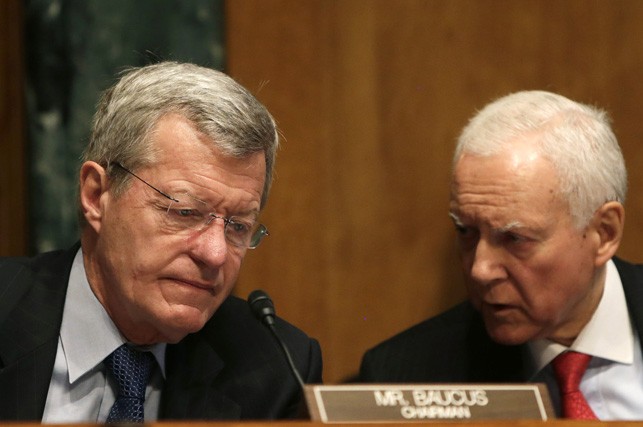WellDesigned Fiscally Responsible Corporate Tax Reform Could Benefit the Economy UnpaidFor Rate
Post on: 28 Апрель, 2015 No Comment

- Some advocates of cutting the corporate income tax rate have greatly exaggerated both the level of tax that U.S. corporations pay and the economic effects of the corporate income tax.
- While the statutory U.S. corporate tax rate is relatively high, effective corporate tax rates the share of their profits that corporations actually pay in taxes are much lower, due to the plethora of corporate tax breaks in the tax code.
- Effective tax rates also differ substantially among different types of investment. For example, some categories of corporate investment are taxed at rates close to the statutory rate, while debt-financed investment is subject to a negative effective marginal rate.
- These large discrepancies create opportunities for revenue-neutral or revenue-raising tax reforms that could benefit the economy by leveling the playing field for different types of investment and thereby removing economic distortions that the current tax code creates.
- The evidence does not support claims that unpaid-for (i.e. deficit-financed) corporate tax cuts would significantly benefit the economy. In fact, a Joint Committee on Taxation analysis found that such tax cuts would actually slightly reduce economic growth over the long run.
- Because deficit-financed tax cuts eventually would have to be paid for (through reductions in programs or increases in other taxes), they would probably leave most Americans worse off even if they generated small economic gains.
Related Areas of Research
Summary
Over the past year, proposals for federal corporate tax cuts and corporate tax reform have received increasing attention. The corporate income tax appears to have joined the long list of tax issues likely to be addressed, or at least debated, over the next few years.
Already, two different approaches have emerged. In October 2007, Ways and Means Committee Chair Charles Rangel introduced legislation that would significantly reduce the corporate tax rate and pay for the rate cut by eliminating several sizable corporate tax breaks. While some applauded Rep. Rangels package as sensible tax reform, others have questioned the notion of paying for corporate rate cuts by scaling back corporate tax benefits. For example, economist Glenn Hubbard, former chair of President Bushs Council of Economic Advisers, wrote in a Wall Street Journal op-ed that economically wise base-broadening alone is not likely to finance a significant corporate rate cut[1] that is, it would not be possible to finance a corporate rate cut of the desired magnitude through base-broadening measures without harming the economy.
The Bush Administration initially appeared to endorse the rate-reducing, base-broadening tax reform model embodied in Rep. Rangels proposal. In July 2007, the Treasury Department issued a major report on business taxation that offered options for financing a corporate rate cut by eliminating corporate tax breaks.[2] But in a December follow-up report, the Treasury commented, it remains unclear whether a revenue-neutral reform would provide a reduction in business taxes sufficient to enhance the competitiveness of U.S. businesses.[3] The implication of this and other such statements is that the overall corporate tax burden, not just the statutory tax rate, needs to be lowered substantially and that paying for a rate cut with base broadening would reduce or eliminate its economic benefits.

Given the serious fiscal challenges the nation faces, it is fortunate that these claims are mistaken. Far from being in conflict, fiscal responsibility and economic efficiency are complementary goals for corporate tax reform. Reforms that eliminate inefficient tax subsidies and thereby raise revenue would also have the effect of leveling the playing field for different forms of investment, making the corporate income tax more economically efficient.
This analysis makes three main points.
- U.S. corporate tax rates are lower, and the economic effects of the U.S. corporate income tax likely smaller, than is often suggested. Some have claimed that the U.S. corporate tax rate is out of line with international norms and unduly burdens American businesses. However, these critics typically focus only on the statutory marginal tax rate. The Treasury Department, the Congressional Budget Office (CBO), and other researchers have found that effective corporate tax rates the share of the return on corporate investment that is actually paid in taxes are far lower than the statutory rate and, depending on the category of investment, are similar to, only modestly higher than, or significantly lower than effective corporate tax rates in other developed countries. As the Treasury Department explained, the United States has a high statutory rate but a low effective rate because of its narrow corporate tax base, which is the result of accelerated depreciation allowances [and] special tax provisions for particular business sectors as well as debt finance and tax planning.[4]
Moreover, while there is good reason to think that the corporate income tax has some economic costs, claims that it greatly harms the U.S. economy or significantly reduces U.S. wages rest on studies that are not applicable to the United States or that suffer from a number of other problems. As the non-partisan Congressional Research Service (CRS) concluded in a recent report, many of the concerns expressed about the corporate tax are not supported by empirical data Claims that high U.S. rates will create problems for the United States in a global economy suffer from a misrepresentation of the U.S. tax rate compared to other countries and are less important when capital is imperfectly mobile, as it appears to be.[5]
Such reform might involve lowering the statutory corporate rate while scaling back corporate tax breaks. As Brookings Institution economist and Hamilton Project director Jason Furman has explained, Both halves of this classic equation have the potential for helping the economy by eliminating the perverse incentives to invest in tax-favored activities rather than in more economically productive activities.[7]
[1] R. Glenn Hubbard, The Corporate Tax Myth, Wall Street Journal, July 26, 2007.
www.treas.gov/press/releases/reports/07230%20r.pdf .
www.ustreas.gov/press/releases/reports/hp749_approachesstudy.pdf .
[4] Office of Tax Policy, U.S. Department of the Treasury, Approaches to Improve the Competitiveness of the U.S. Business Tax System for the 21st Century.
[5] Jane G. Gravelle and Thomas L. Hungerford, Corporate Tax Reform: Issues for Congress, Congressional Research Service, updated April 22, 2008.
www.house.gov/jct/x-4-05.pdf .
www.brookings.edu/opinions/2007/1027_corporate_taxes_furman.aspx .














